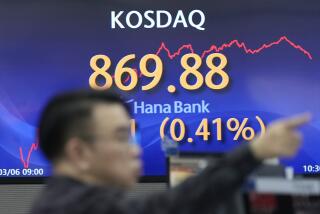A hot market for IPOs shows itself — at least for a week
Ample free food and other perks are nice, but it’s stock options and lofty missions that often seduce people into joining tech start-ups.
That’s why Jeff Green will never forget the excited expressions on employees’ faces last month when he told them their advertising software company would go public. It would open the door for them to cash in on their shares and signal that the company would aggressively chase its ambitions.
For the record:
5:56 a.m. April 20, 2024An earlier version of this article stated that Everbridge lost $58.7 million in 2015. It lost $10.8 million.
“They couldn’t believe that day had actually come and that we had made the decision and chose to do it,” said Green, chief executive of Ventura-based the Trade Desk Inc.
Few start-ups ever reach the point where they can list on Nasdaq or the New York Stock Exchange. But initial public stock offerings have been an even rarer sight this year, which could see the fewest IPOs since the Great Recession. New listings are down about 50% from last year, and experts don’t see the floodgates opening until next year.
Companies have been scared off by financial crises in China and Europe and the unease surrounding the U.S. presidential election. They’re also getting pushed to achieve profitability before going public or accept a haircut in their valuation, investors say. And for most businesses, there’s been ample cash available to stay private longer.
Green, 39, fought past those concerns because he has a fast-growing enterprise that’s making money. Wall Street will never lose its hunger for that combination, he said.
Several other companies with healthy profit margins also made the leap in recent days, fueling the year’s busiest week for IPOs, according to money manager Renaissance Capital. Auto lubricant maker Valvoline had the largest of eight offerings, hauling in $660 million.
The group, including cosmetics products maker e.l.f. Beauty and IT software firm Apptio, raised more than $1.2 billion and all saw their share prices shoot up in public trading.
Investors say it’s a sign of a healthy appetite for risk, though much of the interest stems from persistent weak returns on other investment options. Many of the newly listed companies are trading at big premiums to peers that have been publicly traded for longer.
All but a dozen of the year’s nearly 80 IPOs are trading above their starting price, according to research firm FactSet.
“There’s a lot of cash around, and the alternatives in bonds and elsewhere are not very attractive,” said Todd Morgan, chairman of fund advisor Bel Air Investment Advisors. Investors “are chasing the hot market. They expect all the IPOs will go up.”
It certainly worked out that way for Trade Desk. The company raised more than $78 million from the stock sale on Sept. 20, when shares were priced at $18 each. Shares traded up 76% to $31.69 on their first day on Nasdaq and closed at $27.66 on Friday.
Getting to market required years of preparation and a month of sweating over whether to pull the trigger, Green said.
“The day before we announced to employees a month ago, it felt like the day before marriage,” he said. “I’ll go to married or divorced in the future, but I’ll never be a single again. Life will be different in some way.”
His previous start-up significantly influenced his decision. He had co-founded an advertising company that was sold to Microsoft in 2006, but the company got lost in the shuffle of the technology giant. His team lost its “vision and clarity,” he said.
“I’m not sure if I would have the courage to go public if I hadn’t sold my last company,” he said. “We have all the fundamentals and mechanics working for us. Why would we risk messing that up?”
The Trade Desk provides an online service that lets ad agencies and advertisers automatically place bids in auctions for ad space on websites and apps. The auctions last less than a second, and the Trade Desk’s fee is tied to how much a customer spends on each month’s digital ad buys. The system brought in $75.6 million in revenue and $6.6 million in profit during the first half of the year.
Barely 1% of the money spent on ads worldwide each year is transacted through real-time digital auctions, which means the Trade Desk and rivals like AppNexus and Turn have plenty of room to grow, according to Green.
“Because we’ve just started the transformation, we wanted a mechanism to be in there for the long haul,” he said.
Going public changes life within a company. The Trade Desk’s 450 employees probably feel a bit richer, which may adjust their behavior. The Trade Desk’s bankers have the option to sell stock held by some investors and employees at the IPO price, providing an instant payout. But even those holding onto their shares or subject to a lock-up period in which they can’t sell can see daily price changes, making their wealth feel more real.
“The only way I know to temper that and maintain the culture is talk about it,” Green said. “Money doesn’t define who we are. The hotels we stay in don’t define who we are. What people are looking for is making an impact.”
Several more IPOs are in the works, though there’s unlikely to be a rush of offerings.
Online accounting software developer BlackLine Inc. has filed confidentially to go public as soon as next month, with the 15-year-old company valued at more than $1 billion including its debt, Reuters reported last week, citing anonymous sources. A spokesperson for the Woodland Hills start-up declined to comment.
Founded by Chief Executive and software programmer Therese Tucker, BlackLine’s service centralizes data storage, automates some accounting tasks and provides a layer of analytics to assist in decision making. It is used by companies such as Costco and Boeing. Inc. magazine reported the company generated $83.6 million in revenue last year.
BlackLine could become the most lucrative listing ever of a venture-capital funded company founded or led by a woman in the region, according to financial research firm PitchBook.
The bar was set only last week when emergency-alert software maker Everbridge Inc., co-headquartered in Pasadena and Burlington, Mass., raised $75 million in an offering valuing the company at $323 million, according to PitchBook. Among Everbridge’s co-founders and board members is Cinta Putra, who was CEO from 2002 through 2011.
Everbridge lost $10.8 million last year. But CEO Jaime Ellerston has said the company went public in an effort to lend a stamp of legitimacy to its sales pitch.
“We believe we can gain significant competitive advantage by being the first public company in our space,” he said.
Everbridge started talking to investors a few weeks ago, with the earthquake in Italy and hurricane in Florida providing news to drive home the need for his company’s service.
Company insiders cashed out to the tune of $15 million.
Twitter: @peard33







